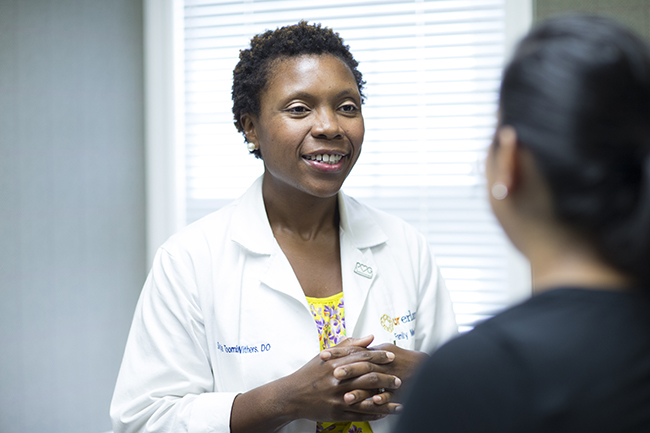From mammograms to pelvic exams, colonoscopies to bone density tests, health screenings provide an important way for doctors to detect and treat potential health problems early on. But how do you know which tests are recommended — and when to get them?
One simple way is to schedule a wellness check with your primary care physician (PCP). During the appointment, your PCP will arrange screenings based on your age and overall health history. For most people, wellness exams are covered by health insurance, and in many cases, screenings are also covered. Please check with your health insurance provider for more information.
What screenings do you really need?
There has been some debate about the best timing and frequency of certain health screenings for women. The Office on Women’s Health, part of the U.S. Department of Health and Human Services, publishes convenient guidelines on when to get tested based on recommendations from the U.S. Preventive Services Task Force (USPSTF).
Here are some highlights based on age:
All ages:
- Blood pressure: Get tested every two years if your blood pressure is lower than 120/80. Higher blood pressure rates warrant more frequent testing.
- Diabetes: Get regular screenings (determined by your doctor) if blood pressure is higher than 135/80 or if you take medicine for high blood pressure.
Twenty and older:
- Cholesterol: Get regular screenings (determined by your doctor) after the age of 20 if you’re at a higher risk for heart disease.
- Cervical cancer: Schedule PAP tests every three years if you’re over the age of 21; every five years after the age of 30 in combination with a human papillomavirus (HPV) test.
Forty and older:
- Breast cancer: Get mammograms every two years if you’re between the ages of 50-74. (The American Cancer Society recommends women get mammograms as early as age 40 and that they get annual mammograms between the ages of 45-54.)
- Colorectal cancer: Get regular screenings (determined by your doctor) if you’re between the ages of 50-75. There are various types of tests, including colonoscopies.
- Osteoporosis: Schedule a bone density test at least once after you reach the age of 65, or as early as 50 if you have a risk of osteoporosis.
While these guidelines are helpful, it’s important to note that there are no universal rules for women’s screenings. That’s why it’s important to manage your screenings through your primary care doctor.
What about immunizations?
We all know about the rigorous immunization schedules for children. What many of us don’t realize is that adult women (and men) also have recommended vaccines. There are the more common ones that provide protection from the flu, shingles and pneumonia, but there are also vaccines that may be recommended based on lifestyle and health history.
The Centers for Disease Control and Prevention (CDC) website features information about adult vaccines as well as downloadable printouts you can share with your doctor.
No matter your age, it’s important to remember early detection is the best protection. Take the time to set up your wellness check with your primary care doctor, and be sure to discuss which screenings are best for you.
Erlanger’s Women’s Health Services offer a wide range of innovative and attentive services to address women’s health care needs from the early reproductive years through older adulthood. Learn more about available screenings.







